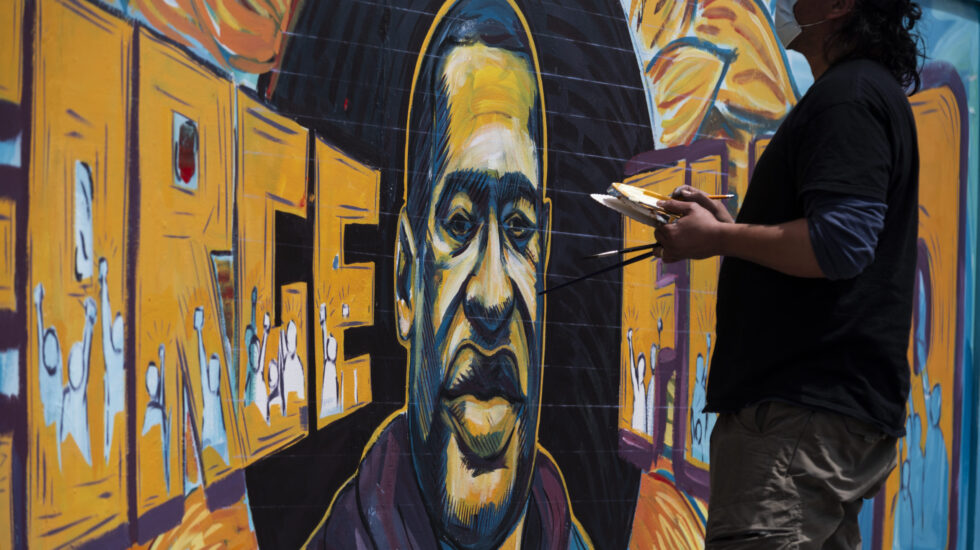On May 25, 2020 George Floyd was killed in police custody after he allegedly used a counterfeit twenty dollar bill to buy cigarettes.
Derek Chauvin, a 19-year veteran of the Minnesota Police Department, detained Floyd and knelt on his neck for nearly nine minutes. Chauvin, who was the subject of at least 22 complaints and investigations before his deadly encounter with Floyd, is charged with second-degree murder, third-degree murder and second-degree manslaughter. He faces up to 40 years in prison if convicted of the most serious charge.
Chauvin’s trial begins today in Minneapolis.
Floyd’s Family: Members of Floyd’s family gathered outside the courthouse this morning and took a knee to commemorate his passing. Floyd’s murder inspired protests across the country. The city of Minneapolis agreed to pay $27 million to Floyd’s family, one of the largest settlements for police misconduct in history.
The Jury: Fourteen jurors will listen to opening statements today. Eight are white, four are Black, and two are mixed race, according to information released by the court.
Prosecutor’s Opening Statement: Jerry W. Blackwell, one of the lead prosecutors, said “Chauvin betrayed this badge.” He added that the “most important” number jurors will hear in the trial is 9 minutes and 29 seconds – the time that Chauvin kneeled on Floyd’s neck. The length of the maneuver was initially reported as eight minutes and forty-six seconds, which has resulted in some confusion.
Blackwell, speaking behind Covid-safe plexiglass, said jurors will learn:
“That he put his knees upon his neck and his back. Grinding and crushing him until the very breath — no, ladies and gentlemen — until the very life was squeezed out of him.”
Blackwell described how Chauvin wouldn’t letup even after he was told by another officer that Floyd had no pulse, “He does not get up. Even when Mr. Floyd does not even have a pulse, it continues on.”
Before showing a video capturing Floyd’s death – filmed by a bystander and viewed by millions on social media – Blackwell warned that it was “graphic.” He said the video was important because it presented things “without lawyer talk” and “without lawyer spin.”
After the video finished playing, Blackwell told the jurors “You can believe your eyes, that it’s homicide, it’s murder.”
Defense’s Opening Statement: Eric Nelson, one of Chauvin’s attorneys, told jurors that they have to disentangle the facts of the case with the wider social justice movement sparked by Floyd’s death. “There is no political or social cause in this courtroom,” he said.
Nelson asserted that Floyd resisted arrested, saying “This was not an easy struggle.” He argued that his client was merely trying to subdued an unruly Floyd. “You will learn that Derek Chauvin did exactly what he had been trained to do over the course of his 19-year career,” he said.
Nelson also previewed what appears to be his client’s main defense: Floyd was high on opioids and an overdose killed him, not Chauvin’s knee. Prosecutors addressed this argument earlier in the day, saying Floyd had built up a high tolerance to opioids and the presence of fentanyl in his system had no impact on his death.
The First Witness: Prosecutors called Jena Scurry, a 911 dispatcher, as their first witness. Scurry watched Floyd’s death in real time on a surveillance feed.
As she watched, Scurry testified that her, “instincts were telling me that something’s wrong, something is not right.” Chauvin had pinned Floyd for so long, she said, she thought her video might have frozen. When she realized it hadn’t, she immediately flagged the use of force to a police supervisor.
“You can call me a snitch if you want to,” Scurry is heard telling a police sergeant on an audio recording played for the jury.
When Chauvin’s defense attorney had an opportunity to cross-exam Scurry, he pointed out that she didn’t have the same experience with accessing the use of violent force as a police officer. He also noted that the squad car in which Floyd was initially detained was rocking back and forth, according to video, suggesting that there could have been a struggle inside.
Later in the day, prosecutors called two more witnesses. Alisha Oyler filmed Floyd’s death from a gas station across the street where she worked. She said police “are always messing with people and it’s wrong and it’s not right.”
The final witness, Donald Williams II, was a bystander who could be heard calling Chauvin a “bum” on a viral video of Floyd’s death. Williams, a mixed martial artist, said he saw Chauvin use a “blood choke.”
The first day of the trial abruptly ended after the court experienced technical difficulties.



